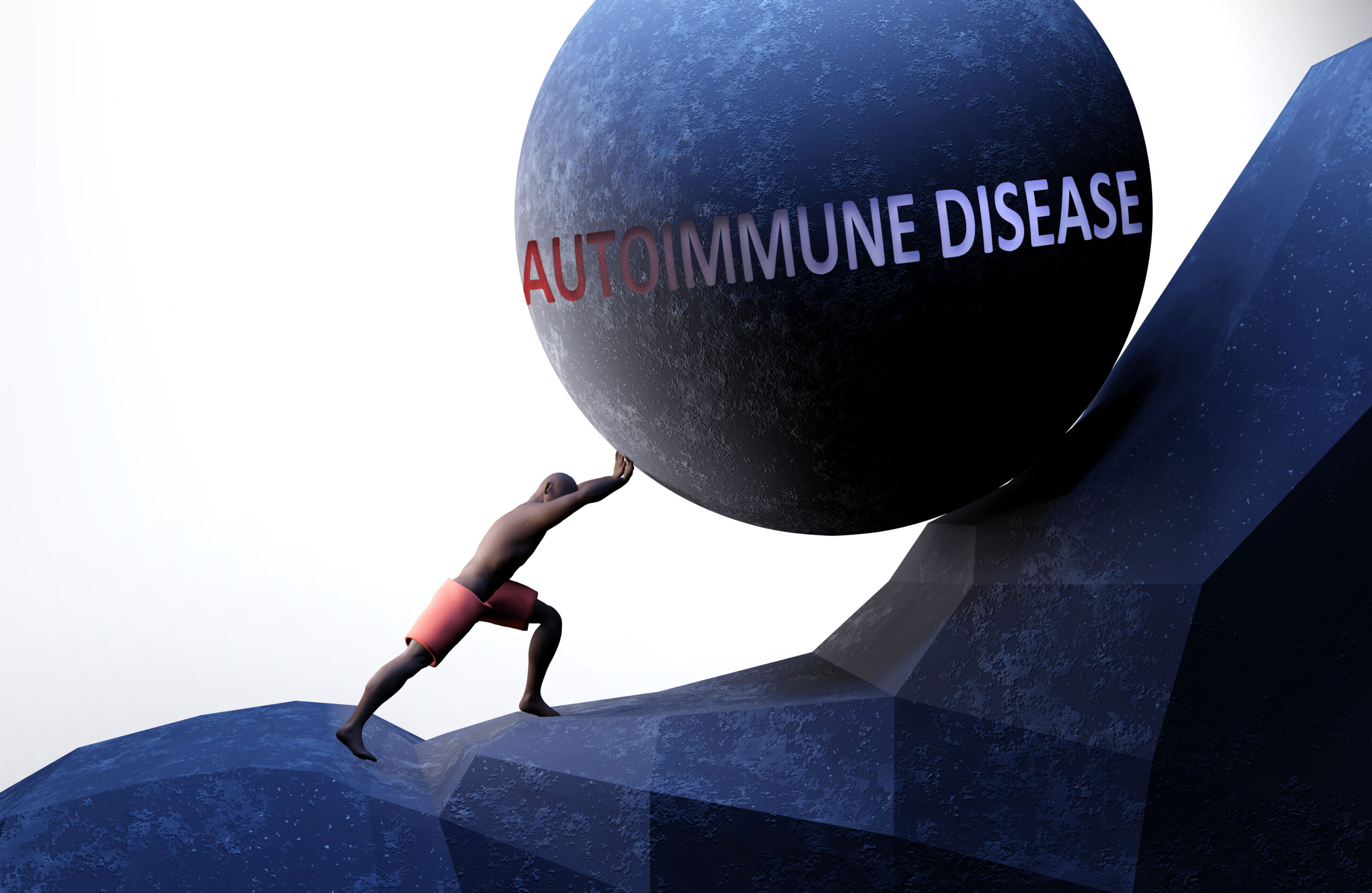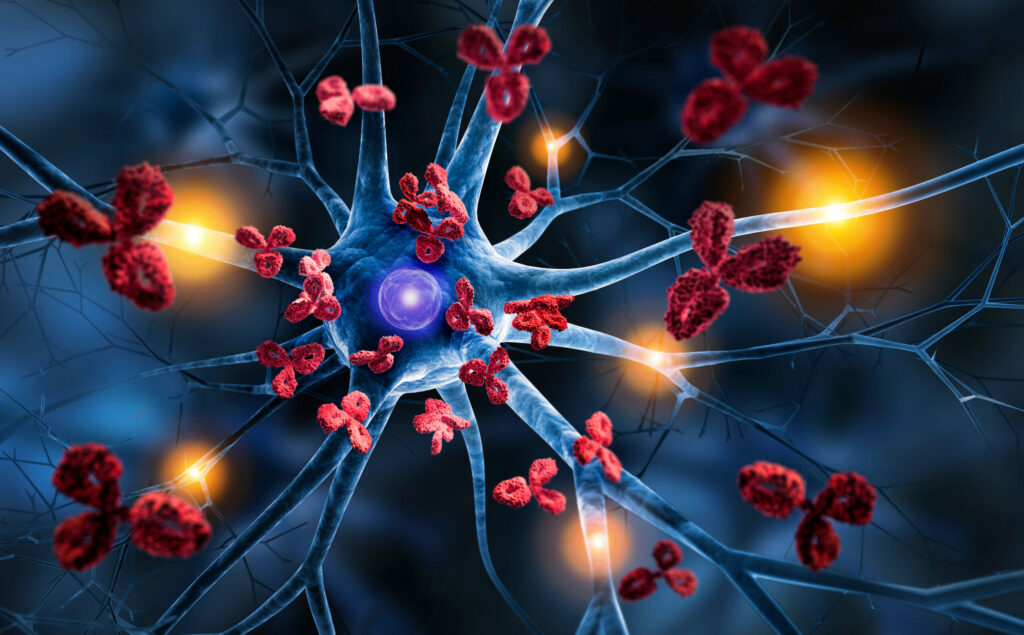
Autoimmune Disease: A comprehensive approach to get you the help you deserve
Your immune system is indispensable. It acts as your main line of defense, protecting you from harmful bacteria, viruses, and other invaders that would otherwise wreak havoc on your body.
A healthy immune system has an unlimited repertoire, which grows as it learns from each challenge to protect you better in the future.
But sometimes your immune system malfunctions and starts viewing itself as the enemy.
In this article, we’ll learn about autoimmune disease and why the “one-size-fits-all” approach of conventional medicine is not working for you.
What is Autoimmunity?
Autoimmunity is the term used to describe when your immune system is no longer the solution – it becomes the problem. In addition to attacking foreign pathogens and other outside invaders, your immune system starts attacking your body’s own cells, organs, and tissues.
In other words, your immune system is unable to distinguish between self and non-self.
The result? A wide spectrum of symptoms that might affect your joints, skin, thyroid, liver, or other body system. These diseases are collectively called autoimmune diseases.
So far, scientists have identified more than 80 different autoimmune diseases, a few of which include:1
- Type 1 diabetes
- Rheumatoid arthritis
- Inflammatory bowel disease
- Multiple sclerosis
- Systemic lupus erythematosus
- Psoriasis
- Addison’s disease
- Graves’ disease
- Celiac disease
- Hashimoto’s disease
Many autoimmune diseases manifest in similar ways, sometimes making diagnosis difficult. Having one autoimmune disease also puts you at a higher risk of developing additional autoimmune diseases, a condition called multiple autoimmune syndrome.2
What Causes Autoimmune Disease?
No one knows for sure.
Some people have a genetic predisposition to certain autoimmune diseases. While the role of genes in autoimmunity is undeniable, there is no single “autoimmune gene.” And autoimmune diseases are rarely caused by a single gene mutation.3
It’s most likely that autoimmune diseases are multifactorial, which means that multiple players are involved.
One potential cause is systemic inflammation. While inflammation is a normal defense mechanism against infection and injury, it can also cause significant damage to your tissues and organs if left uncontrolled.
In recent years, an increasing amount of scientific evidence has shown that abnormal inflammatory response is linked to many chronic conditions, including autoimmune diseases.4
Specifically, autoimmunity can be characterized by:5
- An imbalance between effector T cells (immune cells that promote inflammation) and regulatory T cells (which control inflammation)
- Self-reactive immune cells that manage to escape your immune system’s innate mechanisms to eliminate them, allowing them to attack your body
- Chronic, widespread inflammation
Women are also disproportionately affected by autoimmune diseases. This prevalence is partially attributed to the X chromosome, which has a larger number of genes that relate to your immune system than the Y chromosome.6 A larger number of genes means a greater risk of mutations occurring. And because women have two X chromosomes, they are more likely to be afflicted with an autoimmune disease.
Research studies also suggest testosterone may play a suppressive effect on immune cells that are known to trigger autoimmune reactions.7
Are Autoimmune Diseases Becoming More Common?
Scientists estimate that about 4% of people around the world have at least one autoimmune disease.8
But in the United States, the estimate is about twice that, affecting more than 24 million Americans.8,9 And some scientists are worried that the figure is increasing.
In 2020, a team of researchers noted a growing prevalence of antinuclear antibodies (ANAs), antibodies that target normal proteins in the nucleus of your cells. Because these autoantibodies are capable of signaling your body to attack itself, doctors often test for them to see if you have an autoimmune disorder.
The study evaluated 14,211 U.S. participants aged 12 years and older from three different time periods: 1988-1991, 1999-2004, and 2011-2012. According to their data, the prevalence of ANAs in each time period was as follows:10
- 1988-1991: 11% or approximately 22 million
- 1999-2004: 11.5% or approximately 27 million
- 2011-2012: 15.9% or approximately 41 million
Of the demographics they studied, their findings in the adolescent group (ages 12-19) were the most concerning, as they had the largest ANA increases.
Some scientists argue that the mere presence of ANAs may not indicate autoimmune disease. ANAs can be detected at low levels in healthy individuals, and some may even provide protection against certain diseases.11
6 Reasons a Conventional Medicine Approach Isn’t Helping Your Autoimmune Disease
While the prevalence of autoimmune disease is up for debate, many patients are questioning the conventional medical approach to treating these disorders.
The conventional approach relies almost exclusively on pharmaceutical drugs, which suppress symptoms and may have undesirable side effects. If you have more than one autoimmune disease, you may end up having to take multiple medications that could counteract each other.
Here are 6 more reasons why the conventional medicine approach isn’t always helping your autoimmune disease.
1. Nonspecific Nutrition Recommendations
“You need to eat better.”
Chances are you’ve heard that phrase before. Perhaps your doctor told you that the standard American diet (SAD) is filled with unhealthy, processed foods that promote chronic inflammation.12 In turn, a chronic inflammatory state can turn into autoimmune disorders.
But what, exactly, should you eat?
It’s easy to see why autoimmunity and other chronic illnesses plague so many Americans.13 A quick Google search for “healthy diet” returns 2,560,000,000 results. You have to choose from a myriad of different diets, ranging from the “very-low-calorie diet” to the ketogenic diet to the Mediterranean diet.
Without proper guidance, nutrition can be overwhelming. You can’t just pick one and hope to get better.
In general, we recommend that a healing diet for autoimmune disease includes:
- Adequate fiber14,15
- Omega-3 essential fatty acids16
- Vitamin D17
- Vitamin B18
- More fruits and vegetables15
- Fermented foods15
- Moderate amounts of sodium and long-chain saturated fats15
- Vitamin A19
- Zinc20
- Selenium21
When you become a patient at MaxWell Clinic, our clinicians work with you to develop a nutrition plan specific for you and your condition.
2. Unclear Exercise Recommendations
Along with the general advice of “You need to eat better,” many people are told “You need to exercise more.”
Most, if not all, of us know that exercise is good for our health. Studies have shown that exercise can boost immune cells and anti-inflammatory chemicals in your body.22 Lack of physical activity has been linked to certain autoimmune disorders like rheumatoid arthritis.
What most won’t admit to you is that exercising is hard. It’s even harder for people with an autoimmune illness.
After all, how can you muster up the energy to exercise when getting up from bed is a daily struggle?
When it comes to exercise for those with autoimmune disease, it’s a balancing act.
You may not have the option of pushing your body as hard as you’d like to. It may mean saying no when your teammates want to play another game.
Some studies indicate that high-intensity interval training (HIIT) may be beneficial for those with autoimmune disorders. HIIT involves short bursts of intense exercise for 30 seconds to 2 minutes, resting, then repeating. Anything that raises your heart rate and pushes your body to exhaustion is considered HIIT, including:
- CrossFit
- Power yoga
- Spinning
- Cycling
- Swimming
In a 2018 study, 12 physically inactive patients with rheumatoid arthritis completed 10 weeks of high-intensity interval walking. At the end of the study, the investigators noted significant reductions in joint swelling and improved immune functions.23
An analysis of 12 studies showed that HIIT was more beneficial for patients with type 2 diabetes compared to moderate-intensity training.24
The benefits of HIIT can be partially attributed to its anti-inflammatory effect.25 But whether HIIT is right for you is a discussion you and your MaxWell clinician can have at your appointment. Some people with autoimmune disease have a low tolerance for additional stress on their body. For these patients, HIIT may have the opposite of its intended effect.
The most important thing is that you find a physical activity you enjoy that pushes your body without overwhelming it. As always, consult with your healthcare professional to design an appropriate exercise prescription.
3. Food Allergies and Sensitivities
To most people, allergies and autoimmune disorders may appear to be completely different.
An allergy occurs when your immune system flags harmless substances, like pollen, as dangerous and goes on the offense. In an autoimmune disease, your body mounts an attack on itself.
But at their core, allergies and autoimmune disorders have something in common – your dysfunctional immune system.
Growing evidence suggests the two abnormalities are linked.
Let’s take gluten for example.
Gluten is a protein found in foods like barley, rye, and wheat. When people with celiac disease eat foods containing gluten, their immune system responds by creating inflammation that damages their small intestine.
But gluten isn’t a problem for just those with celiac disease. Gluten contains a protein called gliadin, which increases intestinal permeability by loosening protein complexes called tight junctions.26 This makes it easier for gliadin to make its way into your bloodstream.
The problem with gliadin is that it looks very similar to an enzyme in your intestines and thyroid called transglutaminase. In a case of mistaken identity, your immune system creates antibodies that flag both gliadin and your thyroid for destruction.27
The connection is so strong that some researchers advise screening all patients with autoimmune thyroid disease for celiac disease.28
Walnut allergies may also promote autoantibody development in patients with an autoimmune disease called pemphigus vulgaris.29
All of this lends more support to the fact that nonspecific diet recommendations aren’t good enough for patients with autoimmune disease.
At MaxWell Clinic, we work with you to reduce or eliminate all potential food triggers from your diet. Our comprehensive method measures your antibody levels to food proteins from some of the most ubiquitous substances, including:
- Peanuts
- Dairy
- Gluten
- Soy
- Shellfish
- Fish
- Tree nuts
In some cases, we may recommend doing an elimination diet – a temporary, strategic removal of certain foods. An elimination diet can help us identify specific foods (or groups of foods) you may be intolerant of or sensitive to.
4. Stress
We’ve all experienced stress at some point in our lives. Whether it’s a job interview or a presentation in front of an audience, stress sets off a cascade of biochemical processes in your brain and body.
Let’s take a closer look at just what happens in your body when you’re stressed:
- Your amygdala, an almond-shaped mass in your brain, acts as the communication hub, sending out a distress signal to your hypothalamus.
- Your hypothalamus is the command center of your brain. It communicates with your autonomic nervous system, which floods your body with adrenaline. Your hypothalamus can instruct your body to produce cortisol in the presence of persistent danger.
- Together, these hormones trigger several physiological responses, including faster breathing, blood vessel constriction, dilated pupils, and a slowing down of your digestive system. It directs all of your energy to your muscles, allowing them to react more powerfully.
- When the threat goes away, your cortisol levels return to normal.
It’s an innate, biological response known as “fight or flight.”
Some studies suggest our stress response dates back millions of years.30 Our ancestors’ “fight or flight” response served a purpose when they encountered danger in their environment.
What our ancestors likely didn’t have to deal with is chronic stress.
We’ve known for a long time that stress has negative effects on our immune system. Chronic stress is associated with high levels of pro-inflammatory signaling chemicals called cytokines.31 It can also suppress the numbers and function of your immune cells.32
As we discussed above, chronic low-grade inflammation is thought to be a potential cause of autoimmune disease.
A 2018 study of over 100,000 patients with stress-related disorders showed that stress was a major contributor to the likelihood of developing autoimmune disease.33
But it goes one step further for patients with autoimmune disease. Some studies suggest that the immune systems of people with autoimmune disease also have trouble returning to normal.
One study showed that stress causes certain neuropeptides to be released, which then activate glial cells in the brain. Activated glial cells then release inflammatory molecules, which go on to promote brain inflammation and worsen multiple sclerosis symptoms.34
Similar observations have been made in patients with rheumatoid arthritis.35
This means stress management should be a high priority for patients with autoimmunity.
MaxWell Clinic offers heart-rate variability tests, which provide us with information about the health of your autonomic nervous system. Read more about the heart rate variability test here.
We also test for environmental factors that may be causing physical stress to your body, including allergens, toxins, and infections.
5. Gut Health
Gut health is a fascinating topic, something we’ve only begun to scratch the surface of.
Your gut houses over 100 trillion microorganisms, collectively known as the gut microbiome.36 These bacteria, viruses, and fungi regulate a wide range of functions in your body, including your emotions.
That’s not all. Scientists believe over 70% of your immune system lies in your gut, in the form of gut-associated lymphoid tissue (GALT).37
But your gut is exposed to continuous assault every day, from toxins, food allergens, medications, etc. Over time, tight junctions weaken, allowing these “foreign invaders” to enter your bloodstream – and therefore your entire body. Functional medicine practitioners call this the leaky gut syndrome, or intestinal hyperpermeability.
Leaky gut is considered a potential factor in many chronic illnesses, including autoimmune diseases.38
This means it’s not enough to just eat a healthy diet. Healing your gut should be a crucial part of your treatment plan.
MaxWell Clinic uses the 5R approach to address leaky gut: remove, replace, repair, reinoculate, and rebalance. To learn more about the 5R approach, read our blog here.
6. Environmental Impacts
The science isn’t firm on the environment’s impact on autoimmune disease. Part of the difficulty arises from the fact that autoimmune diseases – as a whole – affect less than 10% of the U.S. general population. When broken down to each individual disease, the numbers are even lower.
This makes identifying environmental influences common to each autoimmune disease very challenging to do.
Still, we can’t deny the impact environmental stressors have on our immune system. Their potential role in autoimmune diseases have been gaining attention in recent years, including effects from:39,40,41,42,43,44
- Pesticides
- Smoking
- Trichloroethane
- Silica
- Mercury
- Pristane
- Infections
- Plastics and plasticizers (like phthalates)
- Climate
- Toxic mold
Research has shown that these environmental triggers alter the gut microbiome, which may, in turn, lead to leaky gut and eventually to autoimmunity. Deciphering exactly how environmental agents cause gut microbiome dysbiosis requires further research.45,46
But chemicals like plastics and phthalates are all around us. How can we avoid all of these environmental triggers?
You may not be able to avoid all of them. But that doesn’t mean there’s nothing you can do.
Your MaxWell clinician may recommend applying the following principles to improve your quality of life:
- Ensuring good nutrition, especially anti-inflammatory foods
- Getting adequate rest and sleep
- Engaging in appropriate exercise
- Managing stress
- Quitting smoking
Nashville Functional Medicine for Autoimmune Disease
No one should live their lives in fear of their own immune system and you are so much more than a diagnosis. We believe your body is designed to heal, and we want to help you regain control of your own health.
If you or your loved one has been diagnosed with an autoimmune disease, we can help. Dr. David Haase (MaxWell Clinic’s medical director and Vanderbilt- and Mayo-trained physician) and his team of caring clinicians have 20 years of experience treating patients with chronic illnesses.
If you’re in the Nashville area, click here to schedule your free 20-minute discovery call with our New Patient Coordinator to see how we can help you. We believe you deserve only the best quality of life, and we want to help you get there.
References:
- https://www.niaid.nih.gov/diseases-conditions/autoimmune-diseases
- https://www.ncbi.nlm.nih.gov/pmc/articles/PMC3150011/
- https://pathology.jhu.edu/autoimmune/development
- https://www.ncbi.nlm.nih.gov/pmc/articles/PMC6421792/
- https://www.ncbi.nlm.nih.gov/pmc/articles/PMC3129000/
- https://www.ncbi.nlm.nih.gov/pmc/articles/PMC7292717/
- https://www.ncbi.nlm.nih.gov/pmc/articles/PMC5970247/
- https://www.nature.com/articles/d41586-021-01836-9
- https://www.niehs.nih.gov/health/topics/conditions/autoimmune/
- https://pubmed.ncbi.nlm.nih.gov/32266792/
- https://mdpi-res.com/d_attachment/antibodies/antibodies-10-00009/article_deploy/antibodies-10-00009-v2.pdf
- https://www.ncbi.nlm.nih.gov/pmc/articles/PMC4034518/
- https://www.cdc.gov/nchs/fastats/obesity-overweight.htm
- https://www.nature.com/articles/s41598-018-28839-3
- https://www.liebertpub.com/doi/10.1089/act.2020.29287.ble
- https://www.ncbi.nlm.nih.gov/pmc/articles/PMC4030645/
- https://pubmed.ncbi.nlm.nih.gov/26751969/
- https://www.karger.com/Article/FullText/505094
- https://pubmed.ncbi.nlm.nih.gov/30081517/
- https://www.ncbi.nlm.nih.gov/pmc/articles/PMC5793296/
- https://academic.oup.com/jcem/article/87/4/1687/2374966
- https://pubmed.ncbi.nlm.nih.gov/29108826/
- https://pubmed.ncbi.nlm.nih.gov/29898765/
- https://pubmed.ncbi.nlm.nih.gov/29329778/
- https://onlinelibrary.wiley.com/doi/10.1111/sms.13754
- https://www.ncbi.nlm.nih.gov/pmc/articles/PMC2653457/
- https://pubmed.ncbi.nlm.nih.gov/15244201/
- https://pubmed.ncbi.nlm.nih.gov/9872614/
- https://www.jacionline.org/article/S0091-6749(19)30604-9/fulltext
- https://journals.biologists.com/jeb/article/224/11/jeb242837/268997/Fight-or-flight-dates-back-to-ancient-ancestors
- https://pubmed.ncbi.nlm.nih.gov/21928900/
- https://pubmed.ncbi.nlm.nih.gov/24798553/
- https://jamanetwork.com/journals/jama/fullarticle/2685155
- https://pubmed.ncbi.nlm.nih.gov/23537508/
- https://pubmed.ncbi.nlm.nih.gov/24274618/
- https://www.ncbi.nlm.nih.gov/pmc/articles/PMC3426293/
- https://www.ncbi.nlm.nih.gov/pmc/articles/PMC2515351/
- https://www.ncbi.nlm.nih.gov/pmc/articles/PMC5440529/
- https://www.frontiersin.org/articles/10.3389/fimmu.2019.03094/full
- https://www.sciencedirect.com/science/article/pii/B9780128143070000396
- https://pubmed.ncbi.nlm.nih.gov/30590961/
- https://www.frontiersin.org/articles/10.3389/fimmu.2020.00550/full
- https://www.ncbi.nlm.nih.gov/pmc/articles/PMC5097114/
- https://www.mdpi.com/1422-0067/22/22/12269/htm
- https://www.frontiersin.org/articles/10.3389/fimmu.2019.03094/full
- https://www.ncbi.nlm.nih.gov/pmc/articles/PMC4290643/
Disclaimer:
This blog provides general information and discussions about health and related subjects. The information and other content provided in this blog, website or in any linked materials are not intended and should not be considered, or used as a substitute for, medical advice, diagnosis or treatment. This blog does not constitute the practice of any medical, nursing or other professional health care advice, diagnosis or treatment. We cannot diagnose conditions, provide second opinions or make specific treatment recommendations through this blog or website.
If you or any other person has a medical concern, you should consult with your health care provider or seek other professional medical treatment immediately. Never disregard professional medical advice or delay in seeking it because of something that you have read on this blog, website or in any linked materials. If you are experiencing a medical emergency, please call 911 or call for emergency medical help on the nearest telephone immediately.


